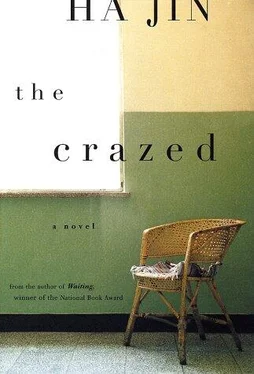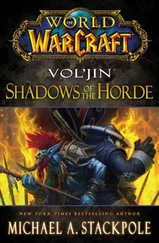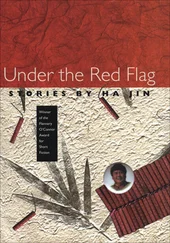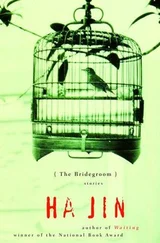This parting, my friend, strings us
Together despite our separate roads.
You may reach any end of the earth,
Yet I shall keep you close like a neighbor.
Please don’t stand at this fork
Wetting your kerchief with our children.
“A sad poem, isn’t it?” he asked and let out a sigh. I didn’t answer, wondering why he had picked this piece to begin his lecture with. In fact Bo Wang belongs to the early Tang period; Mr. Yang was mistaken about the date. To me, the poem wasn’t really sad.
“The theme here is friendship,” he announced. “Two scholar-officials appointed to posts in different provinces bid each other farewell outside the ancient city of Chang An. The parting, the spatial separation, can only tie them closer at heart. You see, people in ancient times had more amiable feelings, much more humane than we are. They cherished friendship, brotherhood, and loyalty. They wouldn’t fly at each other’s throats as we do nowadays. .”
Cheap nostalgia, I thought. Yesterday is always better than today, but who in their right minds can buy this kind of sentimental stuff? If he had been in his senses, Mr. Yang would have commented on the poem in more analytical language. Clearly his mind could no longer engage the text penetratingly, and his critical discourse had partly collapsed.
“On the other hand,” he resumed, “the poem isn’t maudlin at all. The lines are robust and simple, just as the emotion is dignified with restraint. Please note that the language has a fine balance between fluidity and poise. The poem differs remarkably from most of the farewell poems written in the high Tang period. .”
I wondered why he was interested in this poem. He must have been obsessed with the traditional ideal — the union of the official life and the scholarly life. In other words, he might still hanker for the role of a scholar-official. Then it dawned on me that about twenty-five years ago Chairman Mao, in one of his letters to the Secretary of the Albanian Communist Party, Enver Hoxha, had quoted two lines from this very poem—“You may reach any end of the earth, / Yet I shall keep you close like a neighbor.” At that time, Albania was the only socialist country that supported the Chinese Communist Party’s opposition to Nikita Khrushchev’s condemnation of Stalin. It was China’s only ally in the camp of socialist countries. Chairman Mao cited the ancient lines to praise the friendship between the two Communist parties. His quotation made the poem immensely popular among the revolutionary masses for over a decade. It was even set to music.
“Comrades, you all know Chairman Mao is very fond of this poem,” Mr. Yang declared. “It’s a real gem. If Chairman Mao likes it, we all must love it. We must study it, praise it, memorize it, and use it as our moral compass, because Chairman Mao’s words are the touchstone of truth. Any one of his sentences is worth ten thousand sentences we speak.”
I was sick of him! Why did he suddenly talk like a political parrot? He had lost his sense of poetic judgment and again revealed his sycophantic nature. Many people want the power to rule others; Mr. Yang was no exception. The fact that he was a scholar must have made him all the more eager to become an important official, so that he might utilize his learning, put his ideas into practice, and participate in policy making so as to realize his ambition and ideal; otherwise, all his knowledge would serve no purpose and would just rot away in his head. To some degree, he must still have a feudalistic mind-set.
“Next,” he announced, then broke off with a blank face. He fumbled, “What’s next?” He riffled some pages and shut his eyes, as if making an effort to recall a prepared lecture. “Ah yes, here’s the next poem we should discuss today.” He read from an interleaf:
1
You, who come from heaven
To soothe all sorrow and pain
And fill the doubly wretched
With double consolation.
Oh, I am tired of this pursuit!
What for all the pain and joy?
Come, Sweet Peace,
Oh come into my breast!
2
Over the mountain
It’s so quiet.
In all treetops you hardly
Feel a breeze.
The birds are silent in the wood.
Just wait, soon
You will be silent too.
I was impressed by the poet’s longing for a peaceful ending. Mr. Yang’s voice, full of pathos and choking with emotion, conveyed the inmost feelings of a tormented man. After he finished reciting it, the room seemed to be ringing, as if a voice were still descending from the ceiling. But the poetic mood was dispelled by his casual remark. “That’s beautiful, isn’t it?” He squinted at me, smirking.
“Y-yes,” I faltered, wondering what kind of poetry this was. It sounded foreign, definitely not a Tang poem.
“Do you know who the author is?” he asked me.
“No, I don’t.”
“Goethe, Johann Goethe, the great Tang poet. Do you know who translated it into Chinese?” Again he got mixed up — if it was a translation from the German, how could it be a Tang poem?
“I’ve no clue,” I said.
“Me, I did it myself. It took me a whole week.” His eyes brightened while his brows tilted mischievously. “Do you know who speaks in this poem?”
“Goethe, the poet, of course.”
“No, it’s not Goethe who speaks. The speaker can be anyone.” He lifted his face and began lecturing in his normal way. “Comrades, when we analyze a Western poem, we should bear in mind that the speaker and the poet are rarely identical. The fundamental difference between Chinese poetry and Western poetry lies in the use of the persona. In the Chinese poetic tradition the poet and the poetic speaker are not separate except in some minor genres, such as laments from the boudoir and folk ballads. Ancient Chinese poets mostly speak as themselves in their poems; the sincerity and the trustworthiness of the poetic voice are the essential virtues of their poetry. Chinese poets do not need a persona to alienate themselves from their poetic articulation. By contrast, in Western literature poets often adopt a persona to make their poetry less autobiographical. They believe in artifice more than in sincerity. Therefore, when we read a Western poem, we must not assume that the poet speaks. In general the speaker is fictional, not autobiographical.”
I liked his comments, which seemed to make sense. At least they brought him back to his former self, an eloquent professor. Yet I wasn’t sure if his observation was accurate. Before I could consider it further, he continued: “How did such opposite attitudes toward the use of the persona come into existence? In his paper published in Poetic Inquiry three years ago, Professor Beiming Liang argues that this difference should be attributed to the fact that the Western poetic tradition originally had a parallel dramatic tradition, whereas Chinese drama reached its maturity much later than Chinese poetry— in other words, the poetry doesn’t have such a parallel relationship with Chinese drama. Since the persona is essentially a dramatic device, the predilection for it in Western poetry must have originated from the primal connection between the poetic and the dramatic traditions. I agree with Professor Liang in principle. However, I believe we can go further than his theory. To my mind, the difference between the two poetic traditions’ relationships with their respective dramatic traditions may not be the fundamental cause of the opposite attitudes toward the use of the persona. The cause should be explored deeper in the different social orders and cultural structures of the two civilizations.
Читать дальше

![Lao Zi - Dao De Jing [Tao Te Ching] (english)](/books/3890/lao-zi-dao-de-jing-tao-te-ching-english-thumb.webp)
![Lao Zi - Dao De Jing [Tao Te Ching] (chinese)](/books/3891/lao-zi-dao-de-jing-tao-te-ching-chinese-thumb.webp)
![Lao Zi - Dao De Jing [Tao Te Ching] (espanol)](/books/3892/lao-zi-dao-de-jing-tao-te-ching-espanol-thumb.webp)







